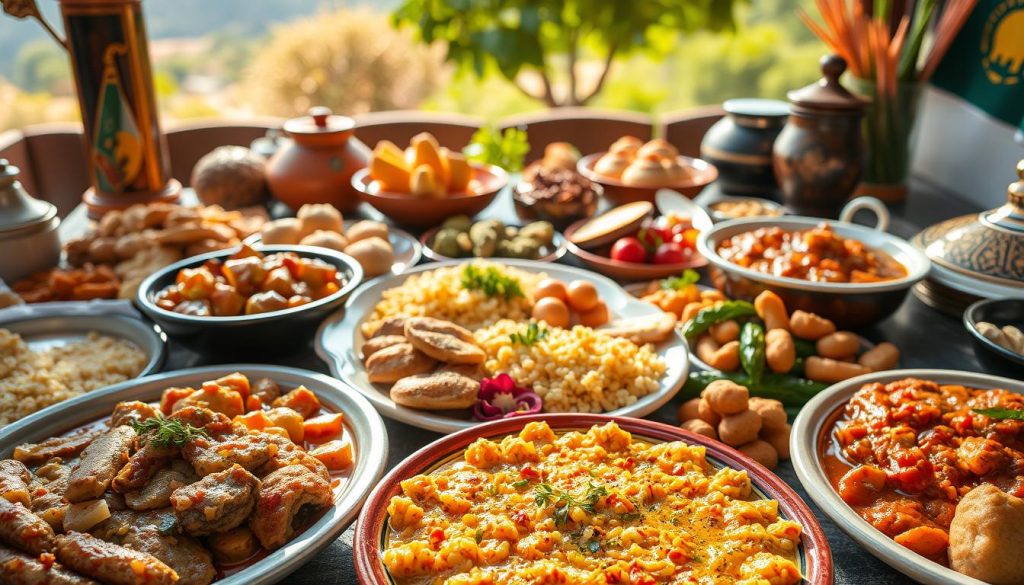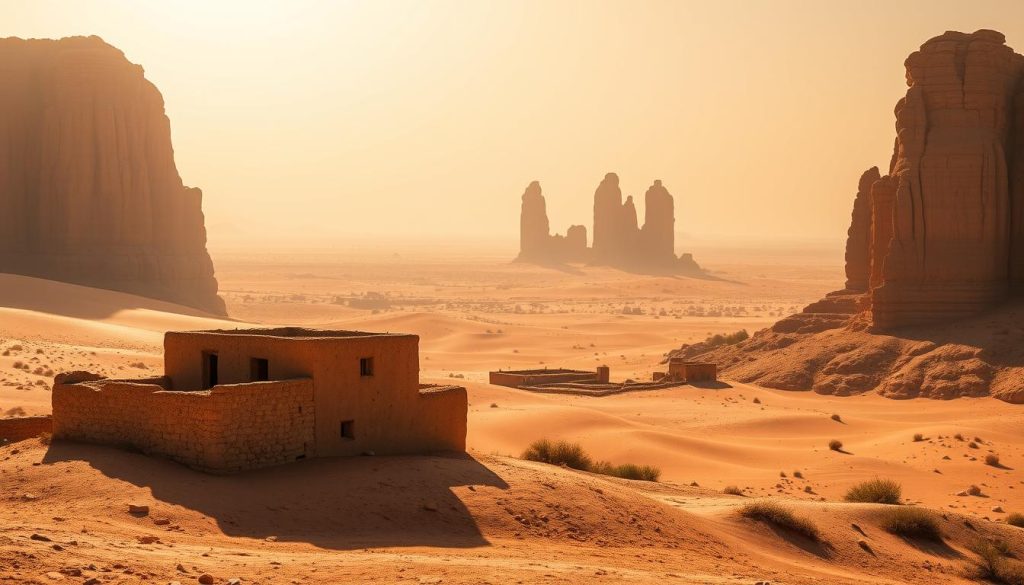What is the speciality of Algeria? Algeria is the biggest country in Africa and the 10th largest globally. It covers 2,381,741 km², mixing the Mediterranean’s beauty with the Sahara Desert’s vastness. With 46.7 million people, it has a low population density of 19 per km².
It has a rich cultural mix, blending Berber, Arab, and French influences. Algeria is 99% Muslim and divided into 58 provinces. It’s also a major player in oil and gas, ranking 16th in oil and 9th in natural gas reserves.
What makes Algeria famous? Its ancient history, from 1.8-million-year-old stone tools to the 19th-century fight for independence, shapes its identity today.
Key Takeaways
- Largest African nation by land area with 2.4 million km².
- Rich in natural resources: 16th in oil reserves, 9th in natural gas globally.
- Cultural fusion of Berber, Arab, and French influences across 58 provinces.
- Home to ancient sites like 700,000-year-old Homo erectus fossils and Oldowan tools.
- High human development (HDI 0.745) despite economic challenges like GDP per capita of $16,483 (PPP).
Algeria’s Rich Cultural Heritage and Traditions
Algerian culture is a mix of Berber, Arab, and French. This blend is seen in Algiers’ streets and the Sahara’s dunes. The name Algeria comes from Arabic, al-Jazāʾir, meaning “the islands,” showing its coastal roots.
The Unique Blend of Berber, Arab, and French Influences
Algeria’s traditions mix old and new. Berber languages like Tamazight live alongside Arabic and French. This mix is seen in architecture and clothes.
Buildings from the Ottoman era stand next to French Art Deco. The haik and djellaba show regional pride.
Traditional Algerian Music and Dance Forms
Music is at the heart of Algeria. Raï, born in Oran, blends folk and modern sounds. Artists like Khaled have made it famous worldwide.
Traditional instruments like the gasba and bendir are used in dances. The Ahwash dance is a colorful spectacle. The National Union of Plastic Arts works to keep these traditions alive.
Vibrant Festivals and Celebrations Throughout the Year
- Eid al-Fitr and Eid al-Adha bring people together in prayer and feasts.
- Independence Day on July 5 celebrates Algeria’s freedom from France in 1962.
- The Festival International de Musique de Sétif showcases music, both traditional and modern, celebrating Algeria’s creativity.
Algeria’s culture is rich and resilient. From Berber Spring protests to couscous, each dish and festival tells a story. They show Algeria’s ability to survive and reinvent itself.
What is the Speciality of Algeria: Culinary Treasures and Gastronomic Delights

Algeria’s famous algerian dishes share a rich history and culture. Couscous, a UNESCO-recognized treasure, and spicy harira soup are just the start. Each dish reflects the blend of Berber, Arab, and French traditions.
Couscous, often served with meat or vegetable stews, is a key dish. Tagines, slow-cooked in clay pots, offer deep, aromatic flavors.
- Mechoui: Slow-roasted lamb, a feast for celebrations.
- Chakchouka: A vibrant tomato-based dish with eggs, popular in Algiers.
- Brik: Crispy pastry filled with tuna and spices, a beloved street snack.
- Makroud: Dates-stuffed semolina sweets, perfect with mint tea.
Regional specialties highlight local ingredients. Coastal cities like Oran enjoy seafood, while the Sahara inspires dishes like rechta. Olive oil and cumin are common flavors, and mint tea is a symbol of hospitality. French colonial ties are seen in flaky pastries like gatina.
Algeria’s culinary traditions are alive in daily meals and festivals. Families come together to make harira during Ramadan. Markets are filled with vendors selling khfaf or garantita. From couscous to harissa-laced stews, these algeria speciality meals offer a taste of North Africa’s vibrant table.
Breathtaking Landscapes and Historical Landmarks

Algeria’s landscapes and historical sites take you on a journey through time and space. From the vast desert dunes to ancient cities, Algeria tourism invites you to explore every corner of this vast nation.
The Magnificent Sahara Desert: Algeria’s Crown Jewel
The Sahara covers 80% of Algeria, with the Grand Erg Oriental and Grand Erg Occidental. In Timimoun, you’ll find crimson-hued oasis towns like Timimoun. Here, you can go on camel treks or enjoy starlit camps.
The Tassili n’Ajjer National Park is home to over 15,000 prehistoric rock drawings. It’s a UNESCO World Heritage Site.
Ancient Roman Ruins and Ottoman Architecture
Discover Algeria’s layered history at these UNESCO-protected sites:
| Landmark | Location | Highlights |
|---|---|---|
| Timgad | Southeast Algeria | Roman city founded by Emperor Trajan, 3,500-seat theater |
| Djemila | Northeast Algeria | 2nd-century Roman ruins, temples, and baths |
| Tipasa | Coastal region | Phoenician, Roman, and Byzantine ruins |
Coastal Mediterranean Beauty and Hidden Beaches
- Bejaia’s Yemma Gouraya National Park offers cliffs and endangered Barbary macaques.
- Skikda’s golden sands contrast with ancient Phoenician ports.
- Algiers’ coastline blends modernity with historical forts like the Casbah.
The Casbah of Algiers: A UNESCO World Heritage Site
This 17th-century labyrinth of whitewashed buildings and Ottoman-era mosques, like the Ketchaoua Mosque, reveals Algiers’ rich past. Wander through narrow alleys to discover artisan shops and historic Algeria landmarks.
Whether tracing Roman footprints in Timgad or watching sunsets over the Sahara, Algeria’s landscapes and history promise unforgettable journeys. Plan visits during spring or autumn for ideal climates.
Conclusion: Why Algeria Deserves a Spot on Your Travel Bucket List
Algeria is famous for its rich history and modern charm. You can see ancient Roman ruins and bustling markets. The Sahara’s dunes and Tassili n’Ajjer’s rock art show the land’s deep history.
Traveling here is like going back in time. You’ll see Berber traditions, French architecture, and Arab influences. It’s a mix of cultures that’s truly unique.
Algeria’s landscapes are as varied as its history. The Mediterranean coast meets the Atlas Mountains. The Ahaggar Highlands offer untouched beauty.
UNESCO sites like the Casbah of Algiers and Tipaza’s ruins attract history lovers. The Sahara’s Taghit oasis and its date festival celebrate local traditions. Even lesser-known sites like Wadi Djerat rock carvings show the land’s rich past.
Despite its vast size, Algeria is still a hidden gem. It has 29 attractions, from Roman-era Djemila to the M’zab Valley’s mud-brick cities. The food, festivals, and people make the experience unforgettable.
Algeria’s beauty is not just in its landmarks but in its people. From Constantine’s souks to quiet oases, visiting supports local traditions. It balances modernity with heritage, showing resilience in its landscapes and culture.
For those seeking real adventures, Algeria is the place. You can explore Roman ruins or enjoy couscous under the Sahara stars. With its vast desert, history, and culture, Algeria is a North African treasure waiting to be discovered.
